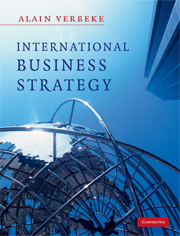Book contents
- Frontmatter
- Contents
- List of figures
- List of case studies
- About the author
- Foreword
- Acknowledgements
- List of abbreviations
- Walkthrough
- Introduction and overview of the book's framework
- Part I Core concepts
- Part II Functional issues
- Part III Dynamics of global strategy
- 11 Entry mode dynamics 1: foreign distributors
- 12 Entry mode dynamics 2: strategic alliance partners
- 13 Entry mode dynamics 3: mergers and acquisitions
- 14 The role of emerging economies
- 15A International strategies of corporate social responsibility
- 15B International strategies of corporate environmental sustainability
- Conclusion. The true foundations of global corporate success
- Appendix: Suggested additional readings
- Index
11 - Entry mode dynamics 1: foreign distributors
from Part III - Dynamics of global strategy
- Frontmatter
- Contents
- List of figures
- List of case studies
- About the author
- Foreword
- Acknowledgements
- List of abbreviations
- Walkthrough
- Introduction and overview of the book's framework
- Part I Core concepts
- Part II Functional issues
- Part III Dynamics of global strategy
- 11 Entry mode dynamics 1: foreign distributors
- 12 Entry mode dynamics 2: strategic alliance partners
- 13 Entry mode dynamics 3: mergers and acquisitions
- 14 The role of emerging economies
- 15A International strategies of corporate social responsibility
- 15B International strategies of corporate environmental sustainability
- Conclusion. The true foundations of global corporate success
- Appendix: Suggested additional readings
- Index
Summary
This chapter examines Arnold's idea that, when selling in foreign markets, MNEs should maintain relationships with local distributors over the long term even after establishing their own local network to handle major clients. In theory, local distributors provide knowledge about the local market, knowledge of local regulations and business practices, existing major customers at low cost, and the ability to hire appropriate staff and develop relationships with potential new customers. Selecting and managing distributors is difficult, though, and Arnold provides a list of seven best practices. These ideas will be examined and then criticized using the framework presented in Chapter 1.
Significance
In an important HBR article, David Arnold studied the role of external actors, specifically foreign distributors, in international strategy. Arnold focused on the evolving role of local distributors when MNEs first establish themselves in new markets and then try to grow these markets. He observes that many MNEs initially establish relationships with local distributors in order to reduce costs and minimize risks. In other words, the local distributor's complementary capabilities (e.g., knowledge of local regulations and business practices, ability to hire appropriate staff and relationships with potential customers) substitute for developing new, location-bound FSAs required to access the host country market, in cases where market success is highly uncertain. Unfortunately, however, after enjoying some early market penetration, sales often flatten and may even start declining.
- Type
- Chapter
- Information
- International Business StrategyRethinking the Foundations of Global Corporate Success, pp. 285 - 308Publisher: Cambridge University PressPrint publication year: 2009



